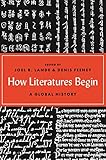How Literatures Begin : A Global History / ed. by Joel B. Lande, Denis Feeney.
Material type: TextPublisher: Princeton, NJ : Princeton University Press, [2021]Copyright date: ©2021Description: 1 online resource (432 p.) : 10 color + 34 b/w illus. 2 mapsContent type:
TextPublisher: Princeton, NJ : Princeton University Press, [2021]Copyright date: ©2021Description: 1 online resource (432 p.) : 10 color + 34 b/w illus. 2 mapsContent type: - 9780691186528
- 9780691219844
- Literature -- History and criticism
- LITERARY CRITICISM / Comparative Literature
- Apocrypha
- Auerbach
- Bible
- Chanson de Roland
- Dead Sea Scrolls
- Koran
- Pseudepigrapha
- Sanskrit
- Vico
- cosmopolitan
- cosmopolitanism
- cosmopolitcan
- criticism
- cultural difference
- cultural identity
- development of writing
- elite
- fiction
- globalism
- national
- nationalism
- oral tradition
- orality
- philology
- poetry
- religion
- sacred
- script
- secular
- untranslatability
- vernacular
- written languages
- 809 23
- PN523
- online - DeGruyter
| Item type | Current library | Call number | URL | Status | Notes | Barcode | |
|---|---|---|---|---|---|---|---|
 eBook
eBook
|
Biblioteca "Angelicum" Pont. Univ. S.Tommaso d'Aquino Nuvola online | online - DeGruyter (Browse shelf(Opens below)) | Online access | Not for loan (Accesso limitato) | Accesso per gli utenti autorizzati / Access for authorized users | (dgr)9780691219844 |
Frontmatter -- CONTENTS -- ACKNOWLEDGMENTS -- CONTRIBUTORS -- INTRODUCTION -- Part I. East and South Asia -- Introduction -- 1 Chinese -- 2 Japanese -- 3 Korean -- 4 Indian -- Part II. The Mediterranean -- Introduction -- 5 Greek -- 6 Latin -- 7 Hebrew -- 8 Syriac -- 9 Arabic -- Part III. European Vernaculars -- Introduction -- 10 English -- 11 Romance Languages -- 12 German -- 13 Russian -- Part IV. Modern Geographies -- Introduction -- 14 Latin American -- 15 African -- 16 African American -- 17 World Literature -- Conclusion -- Notes -- Bibliography -- Index
restricted access online access with authorization star
http://purl.org/coar/access_right/c_16ec
A comparative history of the practices, technologies, institutions, and people that created distinct literary traditions around the world, from ancient to modern timesLiterature is such a familiar and widespread form of imaginative expression today that its existence can seem inevitable. But in fact very few languages ever developed the full-fledged literary cultures we take for granted. Challenging basic assumptions about literatures by uncovering both the distinct and common factors that led to their improbable invention, How Literatures Begin is a global, comparative history of literary origins that spans the ancient and modern world and stretches from Asia and Europe to Africa and the Americas.The book brings together a group of leading literary historians to examine the practices, technologies, institutions, and individuals that created seventeen literary traditions: Chinese, Japanese, Korean, Indian, Greek, Roman, Hebrew, Syriac, Arabic, English, German, Russian, Latin American, African, African American, and World Literature. In these accessible accounts, which are framed by general and section introductions and a conclusion by the editors, literatures emerge as complex weaves of phenomena, unique and deeply rooted in particular times and places but also displaying surprising similarities. Again and again, new literatures arise out of old, come into being through interactions across national and linguistic borders, take inspiration from translation and cultural cross-fertilization, and provide new ways for groups to imagine themselves in relation to their moment in history.Renewing our sense of wonder for the unlikely and strange thing we call literature, How Literatures Begin offers fresh opportunities for comparison between the individual traditions that make up the rich mosaic of the world’s literatures.The book is organized in four sections, with seventeen literatures covered by individual contributors: Part I: East and South Asia: Chinese (Martin Kern), Japanese (Wiebke Denecke), Korean (Ksenia Chizhova), and Indian (Sheldon Pollock); Part II: The Mediterranean: Greek (Deborah Steiner), Roman (Joseph Farrell), Hebrew (Jacqueline Vayntraub), Syriac (Alberto Rigolio), and Arabic (Gregor Schoeller); Part III: European Vernaculars: Romance Languages (Simon Gaunt), English (Ingrid Nelson), German (Joel Lande), Russian (Michael Wachtel); Part IV: Modern Geographies: Latin American (Rolena Adorno), African (Simon Gikandi), African American (Douglas Jones), and World Literature (Jane O. Newman).
Mode of access: Internet via World Wide Web.
In English.
Description based on online resource; title from PDF title page (publisher's Web site, viewed 25. Jun 2024)


